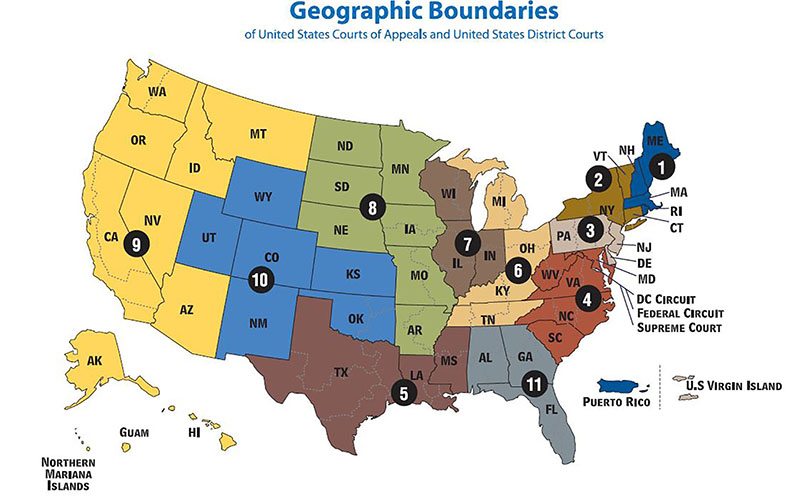
Besides being the largest federal circuit, the 9th U.S. Circuit Court of Appeals is often cited as the most liberal, but legal experts challenged that claim. (Photo by Tim Evanston/flickr via Creative Commons)

Supporters of proposals to break up the 9th U.S. Circuit Court of Appeals say the circuit – made up of 13 federal court districts spread over nine states – is too big and moves too slowly. (Map courtesy uscourts.gov)
WASHINGTON – Arizona lawmakers introduced bills Wednesday that would pull Arizona and four other Western states out of the 9th U.S. Circuit Court of Appeals and form them into a new circuit.
Supporters say the bills, introduced by Sen. Jeff Flake, R-Arizona, and Rep. Matt Salmon, R-Mesa, are needed because the current circuit is “oversized and overworked,” which is causing backups in handling cases.
“The longer we go and the more population growth there is in the 9th Circuit, the more delay there is in justice,” Flake said Wednesday. “The hallmark of our system is swift access to justice.”
The circuit currently hears appeals from federal courts in 13 districts spread across nine states, in addition to having jurisdiction over courts in Guam and the Northern Mariana Islands.
This is not the first proposal to break up the circuit – or even the first bill in this session of Congress calling for a breakup. But legal experts say the proposal has never gained traction despite decades of trying.
The latest call for change came from Gov. Doug Ducey last week, who was joined by Flake, Salmon and Arizona Attorney General Mark Brnovich.
They argue that the current circuit’s geographic size and caseload are unmanageable – last week Ducey said the court now takes an “abysmal” 15 months on average to issue a ruling in a case.
In a statement introducing his bill, Salmon said Wednesday that the 9th Circuit now includes about 20 percent of the U.S. population, leading to a court that is “too large, too inconsistent, too slow and too overworked.”
The Flake and Salmon bills would form a new 12th Circuit with Nevada, Idaho, Montana, Alaska and Arizona – leaving neighboring California in the 9th Circuit. Text of their bills was not available Wednesday evening.
A competing bill introduced last year by Rep. Mike Simpson, R-Idaho, would also create new circuit from pieces of the current one, putting Alaska, Arizona, Idaho, Montana, Nevada, Oregon and Washington into a 12th Circuit. Simpson’s bill has yet to get a hearing.
“This has been a proposal for many years,” said Paul Bender, a law professor at Arizona State University. “I can’t remember when it wasn’t being proposed.”
For years, the proposal was backed by former Arizona Republican Sen. Jon Kyl, who was quoted in a statement from Ducey’s office as commending the latest push. In that statement, Kyl said though the problem isn’t new, “it is a growing problem – and it’s not going to work itself out.”
Some critics have suggested that the motive behind a move is the perceived liberal orientation of the 9th Circuit – but Flake said that is not the main reason.
“It definitely has a liberal bias,” he said. “But it has an issue of being overworked and overburdened and (having) timely access to justice.”
Bender said the 9th Circuit “is no more liberal than any other circuit,” a sentiment echoed by University of Arizona Professor of Law David Marcus. But Marcus said politicians’ fears that a “California-dominated district would be too liberal” have made a breakup a political challenge.
The reorganization of the 9th circuit has never happened before because “no one has ever found a good way to do it,” Bender said.
Both professors are skeptical that this latest effort to split the circuit will produce an outcome different from previous attempts.
“I don’t think there’s a particular issue that would galvanize the political support for this,” Marcus said.